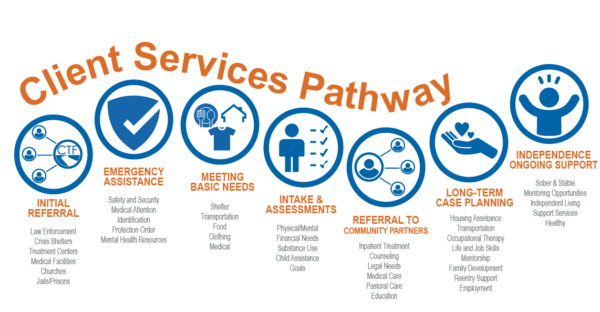Clinical Services Pathway: Long-Term Case Planning
“For I know the plans I have for you,” declares the Lord…” Psalm 16:9
The sixth step in CTF’s Client Services Pathway is Long-Term Case Planning. This step includes continued work towards the client’s long-term goals. Case planning may include housing assistance, occupational therapy, developing life and job skills, mentorship, family development, re-entry support, and employment assistance.
McKenzie, CTF’s Director of Marissa’s House & Outreach Services, explains that CTF has a Housing Navigator on staff to help survivors with obtaining and maintaining housing, which includes working with landlords, providing transitional housing, and promoting housing opportunities for persons experiencing homelessness or housing instability. CTF also operates Marissa’s House, a 12-unit supportive housing site for adult female survivors and their children. McKenzie shared that as of the writing of this blog, Marissa’s House had 12 survivors currently on the wait list. Very few housing options exist across the U.S. for survivors of trafficking and exploitation. But of those that do, even fewer allow survivors’ children. This leaves mothers with an impossible choice between housing and safety and staying with their children. Who wants housing without their kids?” Long-term case planning often includes continued occupational therapy assistance from CTF’s licensed staff. Occupational therapy helps with daily occupations such as sleep hygiene, which includes building sleep inducing habits like using essential oils, white noise, and a weighted blanket and creating a calming sleeping environment. “Sometimes it’s just changing a habit like not drinking an energy drink before bedtime. Helping clients with daily life skills is important when choices were made for you for so long,” McKenzie notes.
Call to Freedom also assists with re-entry. Many survivors have served time in jail or prison due to forced criminality. Survivors’ criminal histories often make it very difficult to obtain employment or housing. Kim, CTF’s Re-entry Case Manager, and Rachael, CTF’s Emergency Services Case Manager, assist survivors transitioning out of criminal justice systems with community reintegration, helping them plan for their future, build healthy support systems, and safety plan.

Mary, CTF’s Survivor Service & Program Coordinator, says that in long-term case planning, one of the most important things she strives for is giving clients hope and ensuring they’re treated with respect and dignity. “It’s a lifelong journey. Each person’s journey is different. We become numb to words, but they matter. One isn’t “just a prostitute” or “drug addict”—they are “being prostituted” or “someone suffering from addiction.” Mary further explains, “Forced criminality becomes normal in your life. Some have dealt drugs, transported drugs, or used drugs. You need to look behind that legal charge. It’s not that clients can’t make good choices; we just don’t know how.” Mary says that throughout her journey as an overcomer, the Sioux Falls community didn’t yet have specialized services available. “Call to Freedom and the community here is so great, because you show us that we matter and are worthy humans.”
Becky Rasmussen, CTF’s President & CEO, shares: “Developing a trusting relationship with a case manager over time is crucial for survivors who may have experienced significant betrayal and exploitation. Long-term case management allows for continuity of care and stability in the survivor’s support network.”
If you or someone you know needs Call to Freedom’s services, please call (605) 759-3565.
Written By:
Kelly Hanzlik
References:

